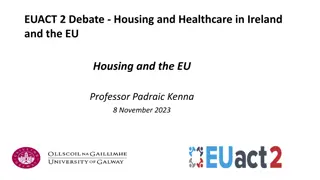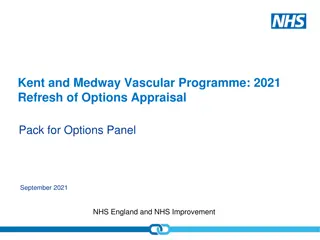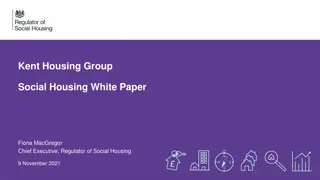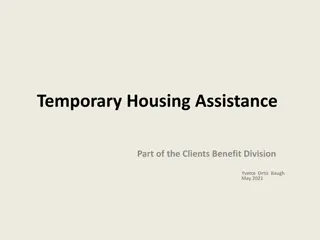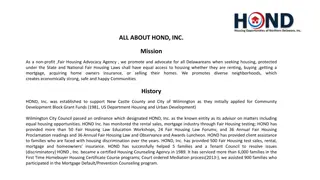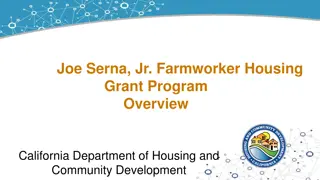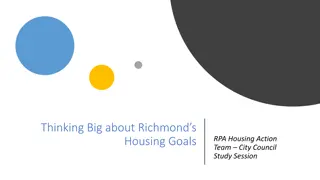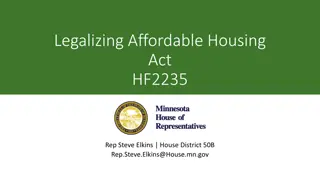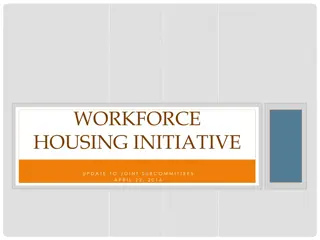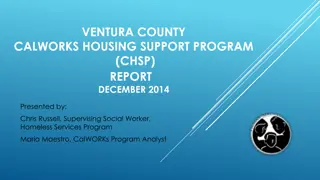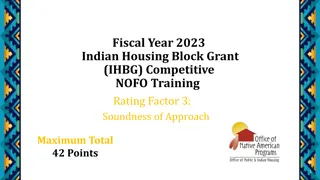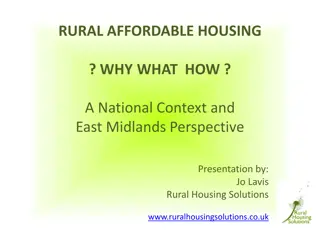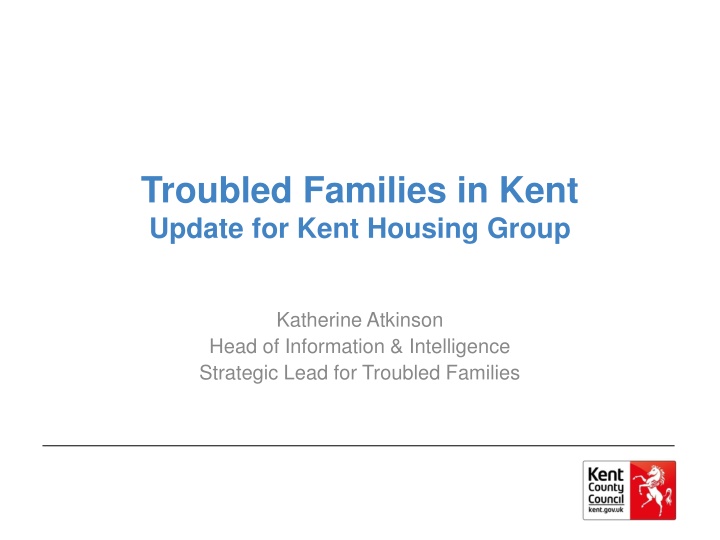
Troubled Families Support Strategies in Kent
Explore the comprehensive approach by Kent Housing Group to address troubled families through service transformation, EHPS strategy, delivery model, and performance claims. Learn about the initiatives and targets set to provide support and enhance family well-being in Kent.
Download Presentation

Please find below an Image/Link to download the presentation.
The content on the website is provided AS IS for your information and personal use only. It may not be sold, licensed, or shared on other websites without obtaining consent from the author. If you encounter any issues during the download, it is possible that the publisher has removed the file from their server.
You are allowed to download the files provided on this website for personal or commercial use, subject to the condition that they are used lawfully. All files are the property of their respective owners.
The content on the website is provided AS IS for your information and personal use only. It may not be sold, licensed, or shared on other websites without obtaining consent from the author.
E N D
Presentation Transcript
Troubled Families in Kent Update for Kent Housing Group Katherine Atkinson Head of Information & Intelligence Strategic Lead for Troubled Families
Service Transformation Service transformation since April 2015 focus on continuous improvement New Unit model for intensive support Early Help brought staff from multiple directorates into a new division Operational work structured in twelve districts across four areas Troubled Families embedded within the Early Help Units an integrated approach to family support
EHPS Strategy and Three Year Plan Four Principles Four Work Strands Ensure a whole system partnership approach across the range of Early Help and Preventative services in Kent We involve children, young people and families, We strive to improve life chances build family resilience and use the strengths of families Develop effective family focused practice approaches Decisions are informed by professional judgement and the working relationship with the child and family Support good health and emotional well-being Promote educational and vocational achievement Work is outcome focused, informed by evidence, performance and evaluation
EHPS Delivery Model Unit Structure Dashboards and Trackers - Outcome Focus Open Access Step Down Panel EH Management Support & EH Toolkit Service Model Workload, not Caseload Signs of Safety Unit Meetings Kent Family Support Framework Triage
Troubled Families Claims 2015/16 2016/17 2016/17 2016/17 2016/17 2016/17 2016/17 2016/17 2016/17 Indicative Percentage towards MINIMUM TARGET (DCLG) Indicative Percentage towards STRETCH TARGET Claims submitted to DCLG SUMMER 16 Claims submitted to DCLG JAN 17 Claims submitted to Audit MAR 17 Potential Total 2016/17 Minimum target (DCLG) 2015/16 Stretch target ASHFORD 0 73 90 58 221 144.4% 153 184.9% 120 CANTERBURY 1 51 74 63 188 83.2% 226 106.5% 177 DARTFORD 2 33 49 34 116 154.7% 75 197.9% 59 DOVER 0 83 87 63 233 110.4% 211 141.3% 165 GRAVESHAM 2 52 79 64 195 137.3% 142 175.7% 111 MAIDSTONE 1 62 91 40 193 129.5% 149 165.8% 116 SEVENOAKS 0 27 35 36 98 122.5% 80 156.8% 63 SHEPWAY 0 72 85 57 214 120.2% 178 153.9% 139 SWALE 7 60 128 78 266 91.1% 292 116.6% 228 THANET 1 106 102 59 267 92.7% 288 118.6% 225 TONBRIDGE & MALLING 3 48 92 40 180 130.4% 138 166.9% 108 TUNBRIDGE WELLS 3 36 34 28 98 108.9% 90 139.4% 70 GRAND TOTAL 20 703 946 620 2269 112.2% 2022 143.6% 1580
Partnership Working Family assessments and plans include partnership working focus wherever appropriate Good links with Health, DWP, Police and Housing Recent spot check by the DCLG assessed our work across a range of randomly selected cases and involved interviewing two Early Help workers one of these told a strong story about the success of working with Housing to turn around a range of issues for a family
DCLG Maturity Model Early Help maturity model that all Local Authorities are required to complete to assess their development against six key strands: The family experience of transformed services; Leadership; Strategy; Culture; Workforce Development; Delivery Structures & Processes Current completing initial assessment but want to share draft with key partners to seek input and ensure it is thorough and honest A process that will be updated annually and subject to peer review
Areas for Development Further embedding of Troubled Families outcomes into Early Help intensive work, to maximise claims and align practice even more fully Youth Justice and Open Access opportunities Specialist Children s Services opportunities Partnership working and communication district links critical Building on areas identified in the maturity model once completed for this year

